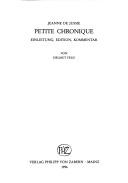| Listing 1 - 10 of 4332 | << page >> |
Sort by
|
Book
ISBN: 9786410002728 Year: 1995 Publisher: Champaign, Ill. : Project Gutenberg,
Abstract | Keywords | Export | Availability | Bookmark
 Loading...
Loading...Choose an application
- Reference Manager
- EndNote
- RefWorks (Direct export to RefWorks)
Martin Luther was a German monk, priest, professor of theology and iconic figure of the Protestant Reformation. He strongly disputed the claim that freedom from God's punishment for sin could be purchased with money. He confronted indulgence salesman Johann Tetzel with his Ninety-Five Theses in 1517. His refusal to retract all of his writings at the demand of Pope Leo X in 1520 and the Holy Roman Emperor Charles V at the Diet of Worms in 1521 resulted in his excommunication by the pope and condemnation as an outlaw by the Emperor. -wikipedia.
Book
ISBN: 9004316353 9789004316355 9789004301023 900430102X Year: 2016 Publisher: Leiden Boston
Abstract | Keywords | Export | Availability | Bookmark
 Loading...
Loading...Choose an application
- Reference Manager
- EndNote
- RefWorks (Direct export to RefWorks)
A Companion to the Swiss Reformation describes the course of the Protestant Reformation in the Swiss Confederation over the course of the sixteenth century. Its essays examine the successes as well as the failures of the reformation movement, considering not only the institutional churches but also the spread of Anabaptism. The volume highlights the different form that the Reformation took among the members of the Confederation and its allied territories, and it describes the political, social and cultural consequences of the Reformation for the Confederation as a whole. Contributors are: Irena Backus, Jan-Andrea Bernhard, Amy Nelson Burnett, Michael W. Bruening, Erich Bryner, Emidio Campi, Bruce Gordon, Kaspar von Greyerz, Sundar Henny, Karin Maag, Thomas Maissen, Regula Schmid-Keeling, Martin Sallmann, and Andrea Strübind.
Book
ISBN: 1498245021 9781532619021 149824503X 1532619022 9781498245036 9781498245029 Year: 2019 Publisher: Eugene, Oregon
Abstract | Keywords | Export | Availability | Bookmark
 Loading...
Loading...Choose an application
- Reference Manager
- EndNote
- RefWorks (Direct export to RefWorks)
The nature and role of positive law has largely been neglected in recent Protestant theology and social ethics. Modern Protestantism and Positive Law introduces and critically summarizes a tradition in Continental Protestant thought about human law, drawing on writings of Barth, Brunner, Ellul, Thielicke, Wolf, Pannenberg, Huber, and Kreβ, many of which have not been translated into English. The book argues that law is an essential political and social institution within developed societies, one that is normative and dependent on an encompassing vision of justice but that also necessarily reflects the contemporary pluralism of those societies. Modern Protestantism and Positive Law argues that theological and ethical perspectives on positive law developed by Protestant thinkers have a place in reflection on positive law, provided they are conceived and expressed in a manner appropriately respectful of the diversity of contemporary opinion regarding the expression of religious perspectives in the public arena.
Book
ISBN: 3666101542 3647101540 Year: 2017 Publisher: Göttingen, [Germany] : Vandenhoeck & Ruprecht,
Abstract | Keywords | Export | Availability | Bookmark
 Loading...
Loading...Choose an application
- Reference Manager
- EndNote
- RefWorks (Direct export to RefWorks)
Book
ISBN: 9783788732035 3788732032 Year: 2018 Publisher: Göttingen Vandenhoeck & Ruprecht
Abstract | Keywords | Export | Availability | Bookmark
 Loading...
Loading...Choose an application
- Reference Manager
- EndNote
- RefWorks (Direct export to RefWorks)
Book
ISBN: 2715405790 9782715405790 Year: 2021 Publisher: Paris: PUF,
Abstract | Keywords | Export | Availability | Bookmark
 Loading...
Loading...Choose an application
- Reference Manager
- EndNote
- RefWorks (Direct export to RefWorks)
Au XVIe siècle, de profondes transformations vont bouleverser le christianisme occidental : avec les Réformes protestantes, un monde religieux unifié sous la houlette de la papauté laisse place à une chrétienté éclatée, bientôt meurtrie par les guerres de Religion. Au monde médiéval succède la modernité. C’est cette histoire que retrace Pierre-Olivier Léchot à l’occasion des cinq cents ans de l’affichage (supposé), le 31 octobre 1517, des 95 thèses de Luther. En présentant les conditions d’émergence des Réformes protestantes et leurs destins à travers l’Europe, en insistant sur leur diversité et en s’arrêtant sur les grandes figures du mouvement réformateur (Luther, Zwingli, Calvin), il ne raconte rien de moins que des changements culturels et intellectuels qui ont durablement modifié le visage de l’Occident.
Book
Year: 1972 Publisher: Hamden (Conn.): Shoe String Press,
Abstract | Keywords | Export | Availability | Bookmark
 Loading...
Loading...Choose an application
- Reference Manager
- EndNote
- RefWorks (Direct export to RefWorks)
Book
Year: 1973 Publisher: Paris: PUF,
Abstract | Keywords | Export | Availability | Bookmark
 Loading...
Loading...Choose an application
- Reference Manager
- EndNote
- RefWorks (Direct export to RefWorks)

ISBN: 3805318693 9783805318693 Year: 1996 Publisher: Mainz: von Zabern,
Abstract | Keywords | Export | Availability | Bookmark
 Loading...
Loading...Choose an application
- Reference Manager
- EndNote
- RefWorks (Direct export to RefWorks)
Book
Year: 1915 Publisher: München: Datterer,
Abstract | Keywords | Export | Availability | Bookmark
 Loading...
Loading...Choose an application
- Reference Manager
- EndNote
- RefWorks (Direct export to RefWorks)
| Listing 1 - 10 of 4332 | << page >> |
Sort by
|

 Search
Search Feedback
Feedback About UniCat
About UniCat  Help
Help News
News